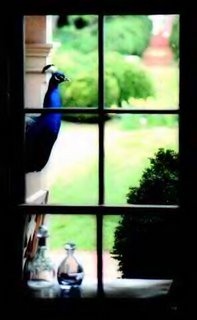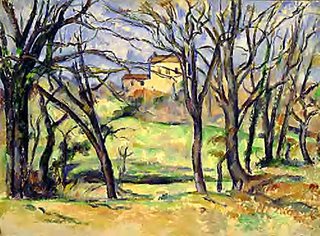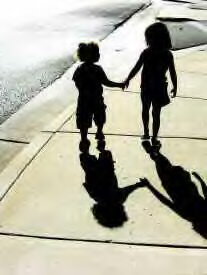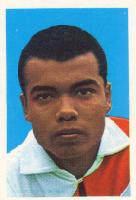Thursday, March 23, 2006
Excerpt - Windows of the Soul
 The following excerpt is from a book called "Windows of the Soul" from Ken Gire. When I first read it, I was deeply moved because I could relate to the sense of blessing inherent in another another person reaching out to me. The person did not know it, but God used that incident and it influenced the course my life in so many ways at that young age that I cannot imagine how things would have turned out otherwise.
The following excerpt is from a book called "Windows of the Soul" from Ken Gire. When I first read it, I was deeply moved because I could relate to the sense of blessing inherent in another another person reaching out to me. The person did not know it, but God used that incident and it influenced the course my life in so many ways at that young age that I cannot imagine how things would have turned out otherwise.In what follows, Ken Gire artfully describes an awkward boy with cerebral palsy, and his interactions with his friends, one of them Ken's daughter. And as the author says, we are poor in many different ways. Aren't we? Maybe I saw a little of myself in the awkward kid, and perhaps my yearning was for something that each one of us would like to have. I don't know what it is, but this story was profoundly moving, and still is.
I would encourage a full reading of the book if you have the time. If not, this slightly lengthy excerpt will hopefully make a worthwhile read:
Windows of the soul offers glimpses, however fleeting, and echoes, however faint, of some of the things that are dear to God. I caught one of those glimpses on a Sunday afternoon obscured with activity. It should have been a day to push back the papers that cluttered the desk of my soul, but the papers were urgent and I was anxious. I was behind a writing project with a fast approaching deadline, so I set aside the Sunday afternoon to spend catching up.
Early that afternoon, though, my daughter asked if I could take her to see a friend who was playing in a roller hockey game. The friend was a boy whom I'll call Joey. He had cerebral palsy, my daughter said, and he asked her at school Friday if she could come and watch him play. She told him that she would, if she could get a ride.
As it turned out, I was the only ride available. I said yes, knowing that if I didn't, that something precious would be lost, and though I didn't know what it was, I knew that it was greater than whatever could be gained by saying no.
When we arrived at the roller rink, I went in with her, thinking that I could find a quiet nook and get some work done. But inside all kinds of noises echoed off the bare walls and the slatted wood floor. Video arcades lined one of the walls, luring young boys with loose change. A concession stand lined another, luring the rest of us. Families of players milled around, talking; several of them leaning against the parameter railing. I was looking for an out-of-the-way place to write when my daughter pointed out Joey. He was playing goalie, hidden behind shin guards, face mask, and a chest guard. He had been positioned where he didn't have to move much, so I hardly noticed that he was handicapped. All I noticed was that he stood a foot taller and years older than other players.
Gathered behind the railing behind Joey were four boys from my daughter's school. She joined them while I nested a vacant table, taking out my pen and notebook, busying up myself with all the catching up I had scheduled for the afternoon. But the sight of those five high school kids and the sound of their cheering distracted me. I stopped and paused and wondered if there was something I should be paying attention to, something that might prove to be a window to the soul.
I turned a fresh page.
I watched. I listened. And I framed the moment with words.
- "Way to go, Joey", one of boys calls out.
- "It's alright, Joey."
The five high school kids cheer.
- "Way to go, Joey."
- "Don’t worry, Joey."
- "Way to hustle. Great defense. Yeah."
"Good job, Joey."
- "Joey, you’re doing great."
 In a letter dated October 10, 1907, the poet talks about his first exposure to the artwork of Cezanne, how he spent hours in front of his pictures, looking, listening, trying to understand them: “I remember the puzzlement and insecurity of one’s first confrontation with his work, along with his name, which is just as new. And for a long time, nothing, and suddenly one has the right eyes. I sat in front of the picture, looking, listening, trying to understand it. For a long time, nothing. Then a memory of the widow at the Temple made a silhouette of my thoughts. She was a person no one noticed until Jesus framed her with his words. I thought of the picture of that poor widow. And of the passage where Jesus talks about giving to the poor. Then of Joey. And suddenly I have the right eyes. Suddenly, I realized that there are many ways that a person can be impoverished, and sometimes the least of those ways materially. That was the case with Joey. His poverty was not material; it was relational. He didn’t need money or what money could buy. He needed something it couldn’t buy – friends. He needed, as we all need, friends who will show up at a cross-town roller rink, lean against the railing, and cheer him on. Some people are rich in friends like that. Joey wasn’t.
In a letter dated October 10, 1907, the poet talks about his first exposure to the artwork of Cezanne, how he spent hours in front of his pictures, looking, listening, trying to understand them: “I remember the puzzlement and insecurity of one’s first confrontation with his work, along with his name, which is just as new. And for a long time, nothing, and suddenly one has the right eyes. I sat in front of the picture, looking, listening, trying to understand it. For a long time, nothing. Then a memory of the widow at the Temple made a silhouette of my thoughts. She was a person no one noticed until Jesus framed her with his words. I thought of the picture of that poor widow. And of the passage where Jesus talks about giving to the poor. Then of Joey. And suddenly I have the right eyes. Suddenly, I realized that there are many ways that a person can be impoverished, and sometimes the least of those ways materially. That was the case with Joey. His poverty was not material; it was relational. He didn’t need money or what money could buy. He needed something it couldn’t buy – friends. He needed, as we all need, friends who will show up at a cross-town roller rink, lean against the railing, and cheer him on. Some people are rich in friends like that. Joey wasn’t.Joey was an impoverished kid groping for his soul’s daily bread in the halls of his high school. With sometimes lame and awkward overtures, he accosts his classmates, holding out his hand for a crust of what they have in such abundance. He begs them to look beyond the disease and all it has robbed him of. He begs them to look beyond the slur of his words and the shuffle of his feet. He begs them to see Joey. Of course he can’t put it into words like that or into any words close to that. His inarticulate emotions can express themselves only in frustration, bouts of depression, and outbursts of anger. It’s the way of the artist, calling to those walking away from his art, begging that they come back and look beyond the paint to see the passion of his soul enflamed on the canvas.
With the language of emotion, a complex and indecipherable language, Joey is begging them to look beyond the jarring and disjointed Picasso that his life appears to be on the surface, pleading with us to see within him the beautiful and breathtaking Michelangelo, which is no less the very image of God. "If we are to love our neighbors," says Frederick Buechner, "before doing anything else we must see our neighbors. With our imaginations as well as with our eyes, that is to say like artists, we must see not just their faces but the life behind and within their faces."
That day I saw something behind the face of the hockey mask and rink on that Sunday afternoon. I looked beyond him to the five kids still at the railing. They could have been at the video arcade. They could have been at the concession stand. They could have been at the table, talking among themselves, joking among themselves, preoccupied with themselves. And who could blame them if they were? We would be there ourselves, doing the same things ourselves, wouldn’t we?
But they weren’t there; they were at the railing. They weren’t preoccupied with themselves; they were preoccupied with Joey. Watching him. Encouraging him. Cheering him on.
And as they did, something changed hands. What was it? I squinted. A gift of some sort. A gift Joey desperately needed. Neither the hands of the giver nor the hands of the receiver were aware of the exchange. But the Father who sees it in secret, He saw it, He took note of it, He treasured it. And so did I.
Was that all there was to see in that picture? Or was there more?
 I looked again. For a long time nothing. And suddenly I have the right eyes. Beyond Joey and beyond the gift that has been given him, I saw a girl who had given up a Sunday afternoon to help give that gift. She had asked to be there. She could have been asked to be somewhere else, the mall, the movies, anywhere. She told a boy with cerebral palsy she would watch him play if she could find a ride. She found a ride. And she kept a promise to someone for whom promises were not so much broken as they were simply forgotten. The picture was a window to my daughter’s soul, revealing to me something of the secret of who she is, a secret I need to know if I am to understand her and nurture her and draw out in her all that is dear to God.
I looked again. For a long time nothing. And suddenly I have the right eyes. Beyond Joey and beyond the gift that has been given him, I saw a girl who had given up a Sunday afternoon to help give that gift. She had asked to be there. She could have been asked to be somewhere else, the mall, the movies, anywhere. She told a boy with cerebral palsy she would watch him play if she could find a ride. She found a ride. And she kept a promise to someone for whom promises were not so much broken as they were simply forgotten. The picture was a window to my daughter’s soul, revealing to me something of the secret of who she is, a secret I need to know if I am to understand her and nurture her and draw out in her all that is dear to God.That Sunday afternoon in that roller rink I saw something sacred, something dear to God. And in a sudden, somewhat sobering moment, I realized that I was the only person in the world who had seen it. Something about that made me feel special, excited to be alive at just that place and at just that time to see then and there what no one else had seen.
And yet something about being the only one also made me feel sad. The moment did something to me that I can’t quite put my finger on, let alone find words for. Maybe, there are no words for such moments in a person’s life. Maybe some moments are too sacred for words. What I experienced that day was profoundly moving, and one of the places it moved me was to wonder: How many windows have I missed because I was too busy to look? And how much wisdom have I overlooked because I was too behind in my schedule to even see what was being offered?
 The problem is not entirely in finding a quiet nook in this roller rink world of ours. The problem is quieting the soul in the midst of the noise.
The problem is not entirely in finding a quiet nook in this roller rink world of ours. The problem is quieting the soul in the midst of the noise.Open your eyes. Otherwise you may miss the windows the Lord has opened for you in seeing another person's heart, or making that little difference that can mean the world.
Labels: Encouragement, Friendships
~Sal
The opposite of love is indifference.
May we have eyes to see the not-so-obvious needs around us, and have the initiative to reach out.
God bless you, bother in the Lord.
-duncan
Post a Comment
<< Home / Visit My Current Blog!
Subscription service
Enter your email address below to subscribe to Reflections on Life and Spirituality blog!(NOTE: Please be assured that this will not be used for spam or unsolicited communications)



